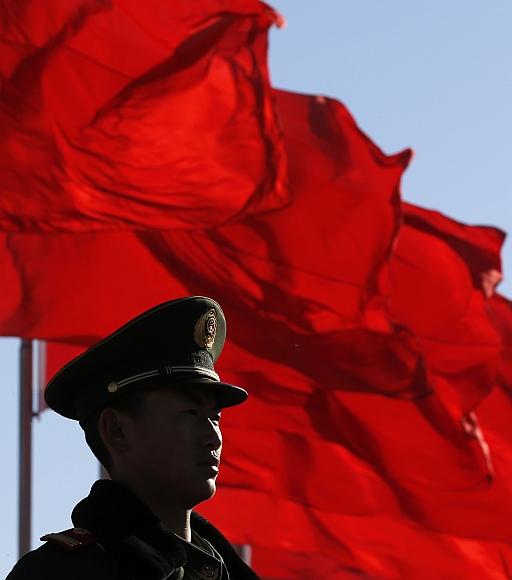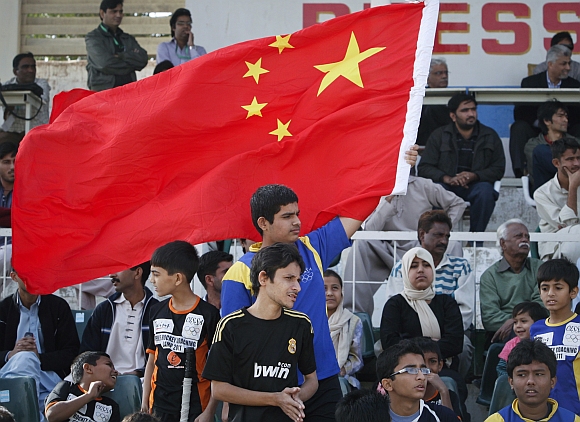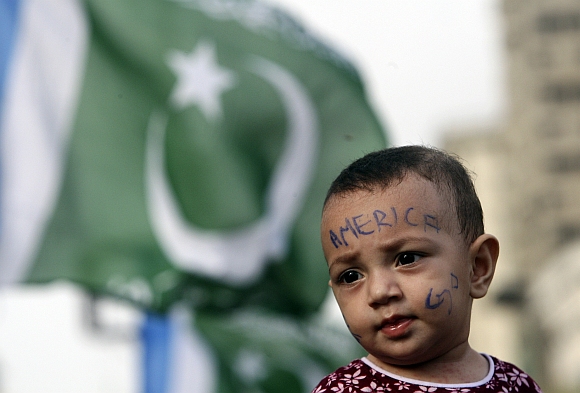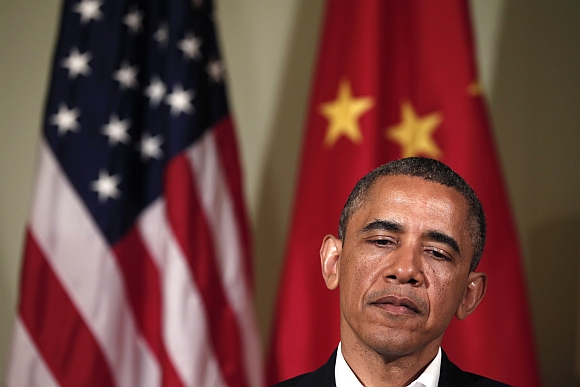This article was first published 12 years ago
Home »
News » China will overthrow US as world superpower. HERE'S WHY!
China will overthrow US as world superpower. HERE'S WHY!
Last updated on: July 19, 2013 11:57 IST
Image: A paramilitary policeman stands guard at Tiananmen Square near the Great Hall of the People in Beijing
Photographs: Kim Kyung-Hoon/Reuters
The Great Recession of 2008 hit United States hard and its impact seems to have a domino effect of sorts. Since 2008, perceptions about the economic balance of power in the world have been shifting.
China has gained rapidly over the past few years and will ultimately replace America as the world’s top global economic force, indicated polls conducted by Pew Research Center’s Global Attitudes Project.
Looking at the 20 nations surveyed in both 2008 and 2013, the median percentage naming the US as the world’s leading power has declined from 47 per cent to 41 per cent while the median percentage placing China in the top spot has increased from 20 per cent to 34 per cent.
This trend has been especially apparent among some of America’s closest allies in Western Europe.
- 53 per cent in Britain say China is the leading economy.
- 33 per cent Brits name US the superpower.
- Six-in-ten Germans (59 per cent) say China occupies the top position, while only 19 per cent think the US is the global economic leader, according to the survey.
- In 23 of 39 nations, majorities say China either already has replaced or eventually will replace the US as the top superpower.
- However, the US is still seen as the world’s leading economy in Latin America, Africa and Asia. According to the poll, 67 per cent in Japan and Philippines and 61 per cent in South Korea back the US.
- 47 per cent Chinese say their nation has already or will replace the US, and 47 per cent are of the opinion that this never happen.
- The American opinion has shifted significantly since 2008, when only 36 per cent said China would become the top global power and 54 per cent believed it would never replace the US
- Only six countries believe China will never replace the US.
Though the survey was conducted in India, the results were not included.
Image: Chinese People's Liberation Army soldiers jump through rings of fire
Photographs: Tyrone Siu/Reuters
The military power of both nations worries many. China’s growing military strength is viewed with trepidation in neighbouring India, Japan, South Korea, Australia and the Philippines.
- More than 9 in 10 in Japan (96 per cent) and South Korea (91 per cent) say that China’s growing military power is a bad thing, the poll points out.
- Seven-in-ten Australians (71 per cent) are concerned about the growing strength of the People’s Liberation Army.
- Only 2 per cent Pakistanis concerned about China’s military prowess
There is also less concern about China in Malaysia (20 per cent) and Indonesia (39 per cent). It is notable, however, that the proportion of Pakistanis, Malaysians and Indonesians who think China’s growing military power is a positive thing for their country is actually down from previous surveys.
...
Image: Pakistani boy waves a national flag of China in Karachi
Photographs: Akhtar Soomro/Reuters
Half or more of those surveyed in 16 of 38 nations surveyed see China as more of a partner.
- 82 per cent in Pakistan think China is a partner.
- 78 per cent Malaysians think China is friendly.
- A number of African nations -- including Senegal (78 per cent), Kenya (77 per cent), Nigeria (71 per cent) and Ghana (70 per cent) – are strongly of the view that China is a national partner.
- 58 per cent Americans think China is neither a partner nor an enemy.
- Only four nations -- Japan (40 per cent), the Philippines (39 per cent), Italy (39 per cent) and Turkey (36 per cent) – look at China as the enemy.
...
Image: 87 pc in Pak feel China is a good influence
Photographs: China Daily/Reuters
Despite their proximity to China, in Southeast and South Asia, the public does not believe China has a greater impact on their countries than the US.
- Malaysians feel there is 72 per cent of Chinese impact on their economy.
- China’s influence is 41 per cent and America’s 44 per cent, feel Pakistanis.
- 87 per cent Pakistanis feel China’s influence is good. Only 5 per cent say America has a positive impact.
- Nearly equal percentages of Indonesians say the two world powers have an influence on their economy (75 per cent for China and 72 per cent for the US). Filipinos, meanwhile, are more likely to believe the US (89 per cent) has a great deal or fair amount of influence on their economy than to say the same about China (69 per cent).
- China is in favour in Malaysia. Indonesians rate each world power’s influence relatively equally.
...
Image: A United States fan covered in body paint ahead of a football game in Kaiserslautern, Germany
Photographs: Toby Melville/Reuters
Among most nations surveyed, people under age 30 are especially likely to have a positive view of America.
- In Turkey, 38 per cent of 18- to 29-year-olds give the US a favorable rating, compared with just eight per cent of Turks age 50 and older.
- 50 per cent in China who areunder 30haveafavourable viewcompared with just 27 per cent among people 50 and older.
- Similarly, in Malaysia there is a 21-percentage point gap between 18-to 29-year-olds and those 50 and older.
...
Image: A child's face is seen painted with the words, 'America Go' during an anti-American demonstration in Karachi
Photographs: Athar Hussain/Reuters
When asked whether they think of the US as a partner to their country, an enemy, or neither, clear majorities in 22 nations say it is a partner. It is seen as an enemy in only four nations included in the survey.
Five of the eight European Union countries polled describe the US as a partner.
- 72 per cent Germans consider US a partner.
- 67 per cent in France think of it as an ally.
- Only 30 per cent of Greeks express this opinion, 22 per cent say the US is an enemy.
- Russians are closely divided: 31 per cent consider the US a partner, but 26 per cent see it as an enemy.
- Among Middle Eastern nations, only Israelis (90 per cent) think of the US as a partner.
- 76 per cent of Palestinians consider the US an enemy.
- In Pakistan, 64 per cent describe America as an enemy.
...
Image: US President Barack Obama listens to a response from Chinese President Xi Jinping
Photographs: Kevin Lamarque/Reuters
Since US President Barack Obama took office in 2009, his popularity has given America’s image a significant boost, especially in Europe. Obama has largely received more positive ratings than his predecessor, George W Bush. But, Obama’s ratings today are lower than when he took office. China has seen a steep decline in the US president’s popularity.
- 88 per cent Germans back Obama and his policies.
- 83 per cent in France; 81 per cent in Canada are Obama supporters.
- 31 per cent Chinese support Obama today, as against 62 per cent in 2009.
...
Image: A girl holds up her evening meal at an assistance centre for flood victims in Nowshera in Pakistan's northwest Khyber-Pakhtunkhwa Province
Photographs: Tim Wimborne/Reuters
Egypt and Pakistan, two nations that are major recipients of US assistance, but surprisingly they do not view it positively.
- 55 per cent in Egypt say economic aid is not useful.
- 43 per cent Pakistanis think impact of US aid is negative.
- However, in the sub-Saharan African countries surveyed -- Kenya, Ghana, Uganda – the US receives positive marks of assistance.
...
Image: A boy, accompanied by his parent, participates in a candlelight vigil at Hong Kong's Victoria Park to mourn those who died in a military crackdown on pro-democracy movement at Beijing's Tiananmen Square in 1989
Photographs: Bobby Yip/Reuters
Compared with the US, the government of China receives much lower ratings for how it treats its citizens.
- 87 per cent in Germany, 86 per cent in France believe individual freedoms are not respected in China.
- 84 per cent in Spain and 82 per cent in Italy feel the same.
- 47 per cent Russians feel the Chinese government respects people’s rights.
- Majorities in 37 of the 39 nations surveyed say the US government respects personal freedoms. The highest ratings for the US on this question come from the Philippines (91 per cent) and South Korea (9 per cent). And at least eight-in-ten hold this view in Lebanon (8 per cent), Japan (85 per cent), Israel (83 per cent), Italy (82 per cent), Germany (81 per cent) and France (80 per cent).
...
Image: A US marine with a drone following its landing at Camp Leatherneck, Afghanistan
Photographs: US Marine Corps/Sgt. Eric D Warren/Reuters
The Obama administration’s use of drone strikes faces broad opposition -- half or more in 31 of 39 countries disapprove of drone attacks against extremist groups. At least three-in-four hold this view in 15 countries from all corners of the world, including nations from the Middle East, Europe, Latin America and Asia, the survey says.
However, three countries support the drone campaign:
- 61 per cent Americans back their government’s drone policy.
- 64 per cent Israelis approve of the US drone strikes; 56 per cent in Kenya.
- German support for drone attacks has actually risen slightly since last year -- today, 45 per cent approve, compared with 38 per cent in 2012.
- 45 per cent in France back drone strikes.
...









